
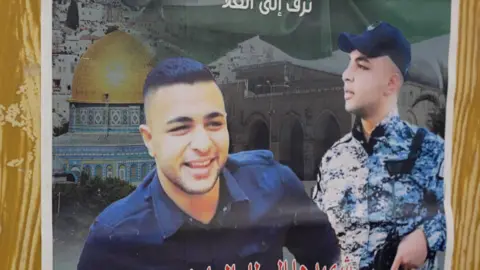 BBC
BBCWhen a white van pulled up next to the Palestinian Customs Police office in Tubas, a town in the Israeli-occupied West Bank, Abdel Nasser Sarhan had no reason to be suspicious.
According to Abdel Nasser’s colleagues, the van driver got out and greeted him in Arabic.
It was early morning. The 24-year-old uniformed policeman had just started duty.
Surveillance footage shows him walking past a guard post, his rifle casually hanging at his side.
Seconds later, a man in jeans and a dark T-shirt emerges from the direction of the white van, followed by uniformed Israeli soldiers.
He raises a gun and shoots Abdel Nasser, killing him.
Soon the street fills with Israeli soldiers. They recover Abdel Nasser’s rifle and, as his colleagues try to recover his body, they continue shooting, all captured on surveillance cameras.

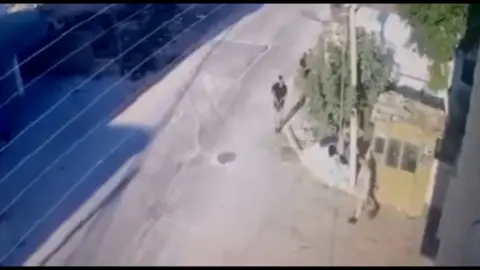
When we visited Tubas the next morning, in late July, we found a makeshift memorial made of stones and withered flowers on the ground where Abdel Nasser fell.
The guard post and the adjacent walls were riddled with bullet holes, each marked with a yellow tag. Faded bloodstains stained the ground and the door.
In a statement released on the day of the incident, the Israeli military said the shooting occurred during an operation to arrest two wanted men.
Abdel Nasser’s colleagues in Tubas said the arrests took place in a house nearby.
The army said the soldiers “encountered armed terrorists” and that “a Palestinian Authority customs official was killed during the firefight.”
According to the evidence provided by the CCTV footage, this last statement is patently false.
An Israeli security official contacted by the BBC two weeks later said the incident was “one of hundreds, if not thousands, of special activities planned and carried out with extreme precision”.
This was revised, he said, “because it didn’t go as planned.”
It seems clear that this was an operation gone wrong.
No one suggested that Abdel Nasser or the customs office were the target of the operation.
It appears that the young guard had the misfortune of stumbling upon an Israeli undercover operation, during which he was fatally shot.

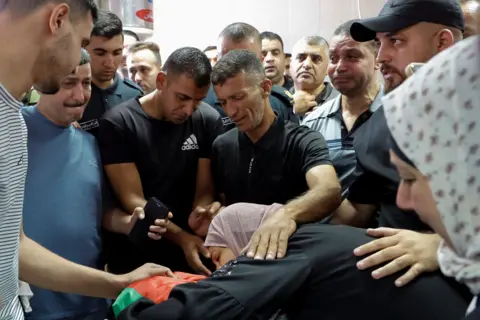 News
NewsBut for Abdel Nasser’s colleagues in the customs police, this tragic episode is part of a broader pattern of behavior that is making it harder than ever for the Palestinian Authority, theoretically responsible for security in areas not under direct Israeli military control, to carry out its duties.
“This rings alarm bells, especially for us in the security services,” Lieutenant Ibrahim Ayyash, spokesman for the Palestinian customs police, told us.
“How can we enforce law and order, provide services to the population and protect them while you obstruct my work and kill my officers?”
Customs officials, he said, were increasingly reluctant to stop suspicious vehicles, for fear of encountering Israeli soldiers operating undercover.
“It is now up to you, as customs officials, to decide whether or not to stop a vehicle,” he said.
“If you stop him and he has special forces [inside]they could kill you.”
As fans of the Israeli TV show Fauda will know, undercover operations were already commonplace in the West Bank well before the outbreak of war in Gaza last October.
Recent evidence suggests that the frequency of such operations has increased, with numerous cases of surveillance footage showing Israeli forces, dressed as civilians, and even medics, abducting wanted Palestinians from city streets and hospital beds.
But these clandestine operations are part of a much larger picture.
With all eyes on Gaza, another war rages in the West Bank as the Israeli military cracks down on armed groups it says are funded by Iran.
“The situation on the ground is very, very complicated,” an Israeli security official told me, speaking on condition of anonymity.
“You could say it’s on the verge of an explosion.”

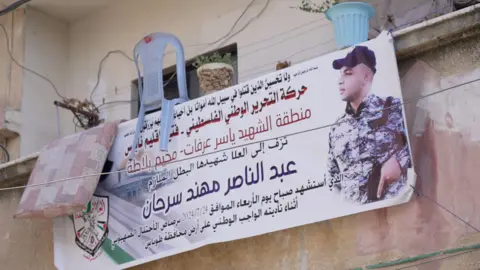
The emergence of a new generation of local armed groups, mostly in refugee camps in the northern West Bank, dates back to around 2021, with the first group appearing in Jenin.
But the war in Gaza has fueled the flames of rebellion in other cities, from Tulkarem to Qalqilya and, most recently, Tubas.
Israel’s security crackdown, the actions of violent Jewish settler groups and the belief that the Palestinian Authority is unable to protect them have contributed to heightened tensions.
“They are very frustrated with Israel, they are very frustrated with the Palestinian Authority and they are looking for an outlet for that frustration,” the Israeli security official said.
The Palestinian Authority’s Health Ministry says more than 600 Palestinians have been killed in the West Bank since last October. About 10,000 have been arrested, according to the Palestinian Prisoners Society.
According to a United Nations count, at least 17 Israelis, including 12 members of the security forces, were also killed in the West Bank.
Some experienced observers fear that the armed clashes could escalate into a full-scale uprising, or intifada.
“If an intifada breaks out, the problem becomes much bigger,” Gen. Israel Ziv, former head of the IDF’s operations division, told me.
“Militarily, we handle things better or worse. But when it comes to an intifada, it’s a completely different story. And it could go there.”
While the Israeli military is still focused on the war in Gaza and the simmering conflict with Hezbollah along the northern border, General Ziv said there is a reluctance to acknowledge a danger much closer to home.
“It’s a huge problem that can blow up in our face in a more sensitive area, [close] to population centers in Israel,” he said.

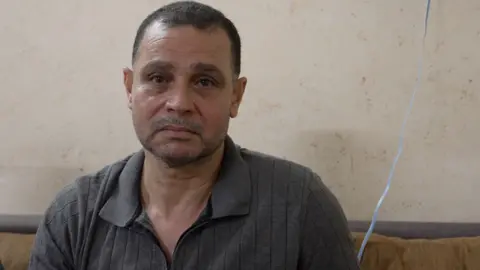
Meanwhile, in Balata refugee camp on the outskirts of Nablus, Abdel Nasser’s family is still mourning.
They looked at the footage from Tubas surveillance cameras and drew their own conclusions about the actions of the Israeli army.
“He came to kill, only to kill,” says Abdel Nasser’s uncle, Ismail Mohammed Sarhan.
Abdel Nasser’s father, Mohannad, can hardly comprehend the loss of his son.
What was it like, I asked him.
“Ambitious, kind, always smiling,” she said, unable to hold back the tears.





